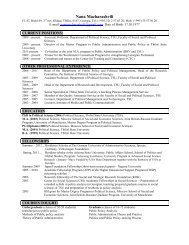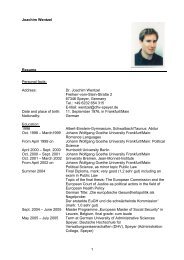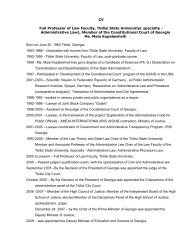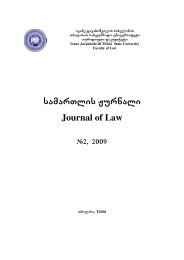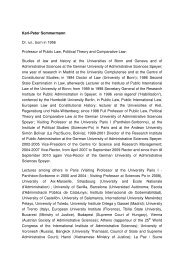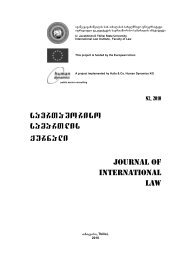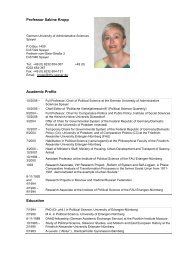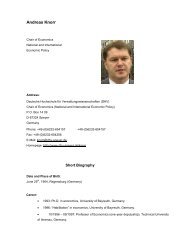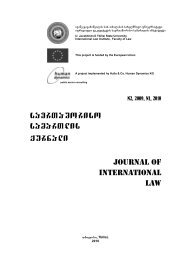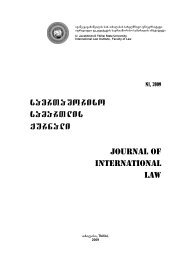Untitled
Untitled
Untitled
Create successful ePaper yourself
Turn your PDF publications into a flip-book with our unique Google optimized e-Paper software.
I. KURDADZE, STAGES OF DEVELOPMENT OF SCIENTIFIC CONCEPTS ON CORRELATION BETWEEN ...<br />
legislator contemplated that the Constitution<br />
of Georgia in any case and not only by the<br />
time of the adoption of the Constitution must<br />
comply with this requirements. At the same<br />
time the question emerges: is the Georgian<br />
legislation objectively in line with the universally<br />
recognized principles and norms of international<br />
law Such a question would not<br />
have emerged, provided that Georgia, even<br />
when undergoing the procedure of ratifying<br />
or accessing the international treaties, would<br />
first require harmonization of the Georgian legislation<br />
with the latter and undertake the procedures<br />
only afterwards. However the practice<br />
of the Georgian Parliament has confirmed<br />
that it is also possible that the country first<br />
ratifies the international treaty and only afterwards<br />
harmonizes the domestic legislation with<br />
the instrument (as an example of this the ratification<br />
of the Statute of the International<br />
Criminal Court can be cited).<br />
The issue can be solved in an easier manner,<br />
when we discuss the international treaties,<br />
even multilateral regional (for example,<br />
in relation with the European Union), as in this<br />
case the will of a state, to limit its sovereignty,<br />
is evident. A state agrees to alter the Constitutional<br />
provision in line with requirements as<br />
envisaged by the international treaty (this is<br />
what did France, and not once, in the process<br />
of transformation of the European Communities<br />
into the European Union). But this, must<br />
be reiterated, refers to international treaty, the<br />
issue of participation into or staying outside<br />
of which is decided by a state.<br />
In case if the domestic law employing body<br />
comes across the inconsistencies in the Constitution<br />
and the universally recognized norms<br />
of international law, it will have a dilemma -<br />
which norm to use. Herewith we support the<br />
view of I. Putkaradze that the norm shall be<br />
used deriving from the primacy of international<br />
law, as the norm directly applicable in Georgia.<br />
Any international court, such as for example,<br />
in the field of human rights, will grant<br />
against a state whose constitution does not<br />
correspond with the universally recognized<br />
norms, especially if it recognizes that its legislation<br />
“is in line with” the universally recognized<br />
principles and norms of international law.<br />
In our view when including the terminology<br />
of universally recognized principles and<br />
norms of international law in the Constitution<br />
of Georgia, the legislator implied that Georgia,<br />
being a member of the contemporary civilized<br />
world community, does share the ideas<br />
recognized by international law and the criteria<br />
of legality recognized by it, as well as the<br />
main directions of international law through<br />
which the regulation of Georgia’s international<br />
legal relations and domestic relations will<br />
take place. The legal system of a state is not<br />
confined to the unity of legal norms. The legal<br />
system includes as legal norms (in relation with<br />
the international law the treaties which were<br />
duly recognized by a state), legal conscious<br />
(which must derive from the content of universally<br />
recognized principles and norms of international<br />
law), the legal relations based on<br />
the norms (among those international ones),<br />
as well as the process of the norm application<br />
(through which the “introduction” of the international<br />
legal norms into the domestic legislation<br />
takes place). Regulation of all these processes<br />
without the universally recognized<br />
norms and principles is inadmissible. The Georgian<br />
legislator is obliged to be guided by these<br />
principles and norms in the legal drafting process,<br />
as they constitute the ideological source<br />
of law. Apart from this, in cases when any given<br />
relation is not regulated by state legal<br />
norms (the vacuum of law), they are used as<br />
an immediate normative basis when deciding<br />
on application of law in a concrete legal case.<br />
Therefore the operation of the universally<br />
recognized principles and norms extends<br />
over not only the domestic law, but at the legal<br />
system as a whole.<br />
The majority of the universally recognized<br />
principles and norms (the law of human rights,<br />
international law of the sea) have a concrete<br />
content, meaning that their direct application<br />
in the field of domestic law is possible. For<br />
example, a judge is obliged to ensure the observance<br />
of norms included into the International<br />
Covenants of 1966 , even if they are<br />
not reflected in the domestic legislation of the<br />
country, not only due to the fact that a given<br />
instrument has become legally binding for<br />
Georgia following its ratification, but also due<br />
to the fact that the majority of the norms of<br />
the instruments carry universal character. The<br />
very principle of respect of human rights, the<br />
principle of equality of a man and a woman,<br />
the principle of freely using the natural resources<br />
and wealth by people, the principle of outlawing<br />
the slavery and slave trade, are among<br />
those. However, a number of norms of the In-<br />
29



